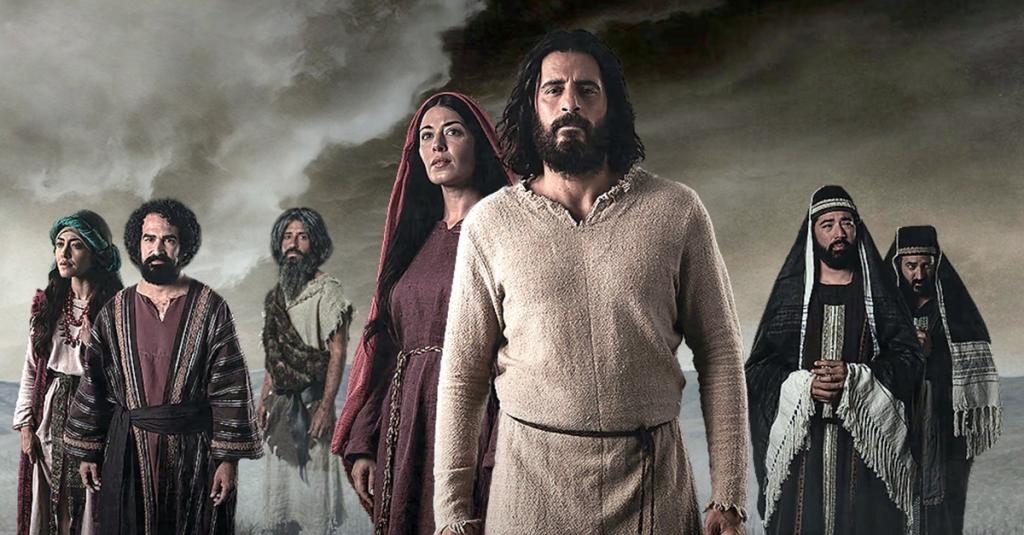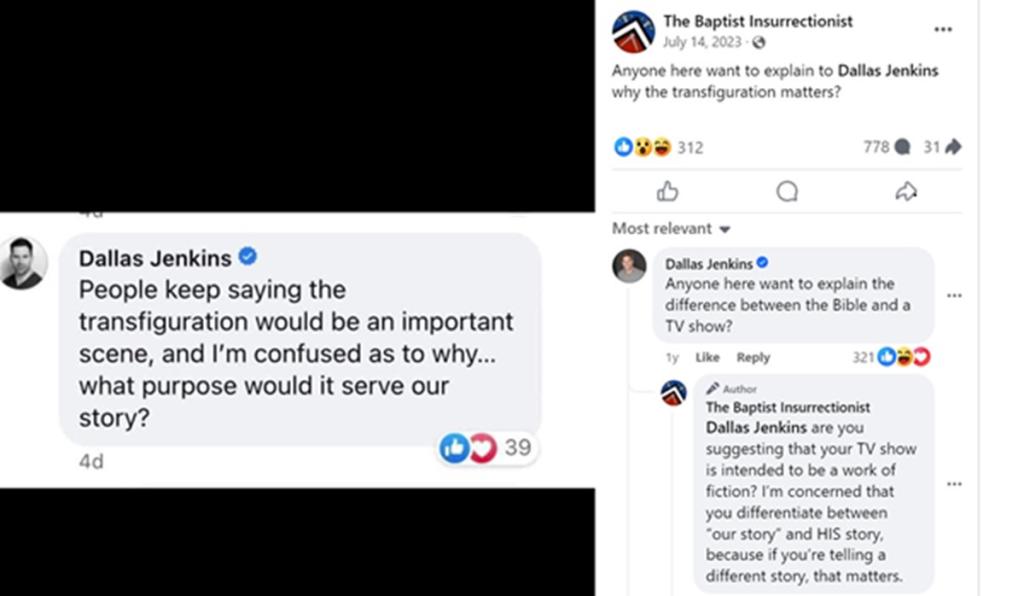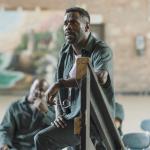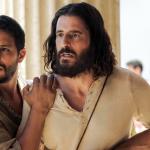In The Chosen, have we now branched off into an alternate version of the Gospels?
In the Marvel Cinematic Universe, a k a the MCU, much is made of timelines. Change something, and a new timeline branches off from the so-called Sacred Timeline. This divergent timeline may be similar to, or wildly different from, the original.
Obviously, as series creator Dallas Jenkins has often noted, The Chosen is a TV show. It’s based on the Gospels, but it’s not meant to be a perfectly exact rendition of the Gospels.
Characters have been added to the original narrative, some things in the sequence of events have been altered, and so on. It’s a work of imagination.
But, at what point in this Jesus Cinematic Universe (JCU for short), has the show deviated so much from the Gospels that it starts to exist in a truly alternate reality?
Let me state emphatically that I am NOT a Bible scholar, not by a long shot. So, if I notice something is different or missing, it’s probably pretty major.
SPOILER ALERT! IF YOU HAVEN’T SEEN SEASON FOUR, LEAVE NOW.
9/28: ALSO, UPDATE AT BOTTOM.
Two things struck me by their absence in season 4, the most recent, of The Chosen: the Transfiguration, and the Bread of Life Discourse.
In Part 1 of a two-part post (here’s part two) we start with …
The Transfiguration (or Lack Thereof)
In the New Testament, this happens just after the visit of Jesus and the disciples to Caesarea Philippi, during which Simon declares that Jesus is the son of the Living God.
Right after that, Jesus bestows upon him the new name of Peter, the Rock (thereby becoming, for Catholics, the first pope). This scene was shown in episode two of season 4 of The Chosen.
In the Transfiguration, a few days later, Jesus takes Peter, James and John to a mountain, where, before their eyes, He is transformed into a figure of dazzling light.
Old Testament prophets Moses and Elijah also make an appearance, and God speaks from a cloud, saying, “This is my beloved Son, with whom I am well pleased; listen to Him.”
Says Catholic Answers:
The Transfiguration of Christ is the culminating point of His public life, as His Baptism is its starting-point, and His Ascension its end. Moreover, this glorious event has been related in detail by St. Matthew (xvii, 1-6), St. Mark (ix, 1-8), and St. Luke (ix, 28-36), while St. Peter (II Pet., i, 16-18) and St. John (i, 14), two of the privileged witnesses, make allusion to it.
Pretty big deal, right?
Didn’t happen in The Chosen.
Not only was it not shown, Peter, James and John never mention it. In the JCU, it appears to have never happened. Instead, the big event of the following episode is the death of Ramah, one of the show’s non-Biblical characters.
Why Would The Chosen Have Apparently Omitted the Transfiguration?
Now, one could argue that The Chosen is a very human-centric view of the Gospels, so maybe having this huge, supernatural occurrence wouldn’t work in the show. In trying to stay strongly connected to Jesus’ human nature, perhaps this was too big a leap into an undeniable confirmation of His divine nature.
OK, from a purely storytelling standpoint, I could buy that.
But, I’m left to wonder, is this the moment where we branched off the Sacred Timeline, if you will, into a Gospel reality where nobody saw Jesus transfigured, nobody saw Moses and Elijah momentarily back from the dead, and nobody heard the Voice of God?
You might think this came up during one of the show’s Bible Roundtables, but, it didn’t.
Despite this, others have noted the omission. It’s been written about. There have been videos, including this lengthy response from an Orthodox priest and his interview guest.
And of course, it’s been discussed on social media. Here’s just one example, from Facebook:
Again, No Bible Scholar, So …
Wanting a more educated view of all this, I checked with Claretian Missionary priest Father Darrin Merlino, host of the interview show The Hound of Heaven.
He said:
I always feel like you should tell the whole story. Even if there was a reference to Peter, James and John talking on one of the side notes.
There seem to be a lot of insignificant conversations about delivering olive oil to the rabbis. Why can’t you have a very significant conversation between the three?
You could have a five-minute discussion on that easily and get the point across. That’s one of things you could have done.
I think if they’re trying to evangelize the nonbeliever, I don’t know why you would take that out. It’s like the precursor to our future is the Transfiguration.
…
I thought the idea of having a TV series on Jesus, on the life of Jesus was brilliant, because you could go really into detail about the life of Christ. But to miss that one, I think about it, the more I go like, gosh, that’s huge.
The Transfiguration is also a precursor to Jesus’ later rising from the dead after the Crucifixion, and to the Communion of Saints in Heaven (including those from before the Incarnation).
The Problem of Adaptation
I recently finished listening to an audiobook of Jane Austen’s Sense and Sensibility. Then, I watched director Ang Lee’s acclaimed 1995 film version, written by star Emma Thompson.
Compared to the huge oil painting that is the novel, the 136-minute film is a light pencil sketch. The main plot points (mostly) and the characters remain, but almost nothing of Austen’s prose or dialogue.
This contrasts with the BBC’s six-hour miniseries version of Austen’s Pride and Prejudice, in which screen adapter Andrew Davies made great use of Austen’s words — but still, much is condensed or omitted.
Or, as I discussed here, James Ellroy’s sprawling novel L.A. Confidential becomes a film which only focuses on one thread from the author’s multilayered story.
In adapting, whether because of story, time or emphasis, there are always choices to be made.
Theologically, as Father Merlino said, it’s tough to defend omitting the Transfiguration, considering the staggering effect it must have had on Peter, James and John.
But, that may be part of the point.
In his development of the TV versions of the characters, Jenkins may not be ready for that. He might want to hold off on such a wallop (or put in a different wallop, such as the death of Ramah).
Still, the JCU’s Peter, James and John are now substantially different than the ones we have in the Gospels. They’ve witnessed a lot, but they did not witness the Transfiguration — and that has to matter.
It’s also a good reminder to always return to the Book (which, to his credit, Jenkins often says).
So, this brings me to part two, the Bread of Life Discourse. This is not so much a total omission as a reshuffling.
But, that’s for next time.
You can watch season four of The Chosen on its own app, BYUtv, on several streaming services, and, starting Sept. 1, on The CW Network.
UPDATE 9/28/24: Online commentator The Chosen Sleuth just came back from The Chosen Insiders Conference, a k a ChosenCon. In the video below, he discusses something that Dallas Jenkins said on day two of the conference, in a portion not livestreamed to the public.
Earlier in the conference, in a public livestream, Jenkins announced further projects in the Chosen Universe, including a three-season series called The Book of Moses.
According to the Chosen Sleuth, Jenkins announced the next day that he would, after all, do the Transfiguration, but, the Sleuth says …
“Dallas has confirmed that he is going to do the Transfiguration, after saying that he was not going to do it, but the catch is, he’s not doing it in The Chosen. He’s going to do it in the Moses show.”
The Sleuth, who is a Protestant, goes on with his own theories on how this all works. But, we do know that both Moses and Elijah made an appearance at the Transfiguration, so … well, it may be a few years before we get an answer.
For the bit on the Transfiguration, hop to about the 18:45 mark.
Image: Season 4 Key Art/The Chosen
Don’t miss a thing: Subscribe to all that I write at Authory.com/KateOHare.














